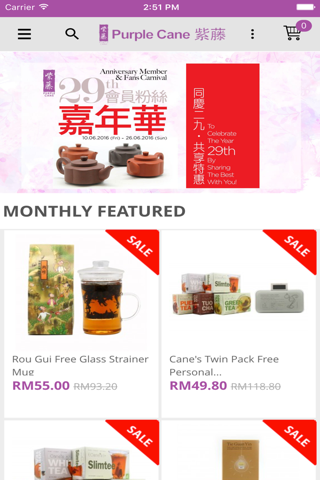
Purple Cane app for iPhone and iPad
Developer: Mices Technology Sdn Bhd
First release : 13 Jan 2016
App size: 15.57 Mb
Established in 1987, Purple Cane opened its first tea house with a difference. Exiquisitely appointed, it creates a conducive ambience and adds value to the tea drinking experience. Over the years, it has been organising different types of cultural activities, including literary and performing art seminars, exhibitions and events. Indeed, it is a far cry from the traditionally operated tea outlets. Besides selling tea leaves, the tea house also provides a stage for literary, music, movies, dances and other humanistic activities.
Owing to its unique positioning and persistence in the tea art concept, Purple Cane soon made a name for itself and captured the publics attention.
In 1996, Purple Cane established Malaysias largest tea art centre at the heart of the city. Loacted at Jalan Sultan, the tea art centre is a one-stop tea lovers heaven, complete with a wide range of tea, tea service, brewing utensils, as well as tea-related products such as tea books, tea music, tea snacks and tea decor. A milestone in the tea industry of Malaysia is firmly in place.
In response to a growing appeal in natural health diet, Purple Cane found Malaysias first tea restaurant in 1997. Pairing tea with food, the restaurant advocates a modern diet concept of light but flavourful dishes with less salt, oil, sugar and no artifical flavours. The dishes retain the original aroma of tea. This begins a trend of the delightful and healthy tea cuisine.
In 1999, the continuous spread of tea art and an increasing number of tea lovers and tea business operators prompted Purple Cane to publish "A Passage To Chinese Tea". The first international Chinese-English book on tea, it provides a comprehensive source of fundamental knowledge on tea art.
In 2001, Purple Cane published a collection of prose related to the unique experience and pleasure of tea drinking, entitled "Taking your time with your cuppa".
Established in 2000, Purple Cane Tea Art Learning Centre is the first institution introducing a system for formal tea culture education in Malaysia. Our operations are based on the key idea of "Taking inspiration in tea for a naturally beautiful life". The innovative course has since attracted people from all walks of life, regardless of race and nationality. There is finally a new horizon for tea lovers.
In 2002, Purple Cane organised the "Seventh International Tea Culture Seminar 2002 cum Malaysia International Tea Festival". Themed "Towards the Golden Century of Tea Culture", the festival presented to the world its multiethnic diversity and beautiful tropical scenery.
Since 1999, Purple Cane has been opening contemporary tea art centres in large shopping centres. There are altogether 22 tea art centres to date, and they are located at the Mega Mall, Genting Highlands, Tesco Hypermart and 1 Utama. The outlets adopt a minimalist style. In a zen-inspired surrounding, one goes back to the basics and appreciates "the beauty of simplicity".
Meanwhile, professional tea art instructors are present at each shop, providing services of high quality which meets with the diverse requirements of modern lifestyle.
Purple Cane has been creating its own brands, such as Zi Zhu Lan and Mini Tuo Tea, right from the start. This management philosophy has been carried through, and over the years, Purple Cane has developed a number of teas not mature in the Malaysia market before, such as Green Tea Long Jing, Wuyi Cliff-Grown Tea, Canes Green Tea and Puer Tea. Flavoured with the South Sea or "Nanyang" concept, Malaysias colorful culture and lifestyle, together with our countrys tea culture, the range of unique tea by Purple Cane enriches and promotes the value of tea art.
Today, Purple Cane embraces the spread of tea culture as it core task. It is hoped that tea, with its popularity that transcends ethnic divides, could act as a cultural bridge that leads to mutual understanding and harmony .



